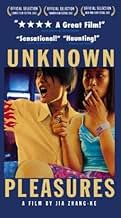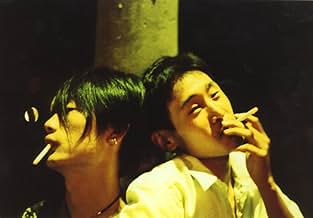IMDb RATING
6.8/10
2.7K
YOUR RATING
Two unemployed Chinese teenagers have trouble resisting the temptations of the Western world.Two unemployed Chinese teenagers have trouble resisting the temptations of the Western world.Two unemployed Chinese teenagers have trouble resisting the temptations of the Western world.
- Awards
- 2 wins & 5 nominations total
Limin Wang
- The Karaoke Customer
- (as Wang Li Min)
Juan Antonio Samaranch
- Self
- (archive footage)
- (uncredited)
Jia Zhang-ke
- Man singing in street
- (uncredited)
- Director
- Writer
- All cast & crew
- Production, box office & more at IMDbPro
Featured reviews
I don't recall where I read a favorable review of this art film, but if I did I would make sure I don't rent anything else they recommend. This film went nowhere. Two Chinese boys with no motivation. They don't take any risks really, and neither do the filmmakers. I was not left with any particular emotion or thought. Photographically it was OK. Perhaps the filmmaker was going for Bergman type effect of portraying emotional emptiness. And maybe its a cultural translation I'm not getting.
Saw parts of China not seen before - the more urban dirty landscape.. So that was a plus. I liked the girl. Her character had the most um, character.
Saw parts of China not seen before - the more urban dirty landscape.. So that was a plus. I liked the girl. Her character had the most um, character.
Unknown Pleasures, directed by Jia Zhangke, powerfully brings home the spiritual malaise affecting Chinese youth as a result of global capitalism. Although the film is set in a small, impoverished Chinese city in remote Shanxi province close to the Mongolian border, there is almost nothing traditionally Chinese in this film other than the location.
Two 19-year olds, Bin Bin (Zhao Wei Wei) and Xiao Ji (Wy Qiong) are heavily influenced by American culture and seem to exist only for their own immediate pleasure. They live on the margins in a city where, according to the director, two-thirds of the population were unemployed in 2001. They drink coke, chain smoke cigarettes, covet U.S. dollars, talk excitedly about Hollywood movies such as Pulp Fiction, and dance to Western-style music at the local club. In the words of Kent Jones (Film Comment Sept/Oct 2002), the protagonists are "media-addicted, resigned to momentous change, and powerless to understand or affect it".
Bin Bin lives with his mother (Bai Ru), who works at a local textile factory and sympathizes with the Falun Gong (an extreme Buddhist religious sect that has been persecuted by the Chinese Communist government). Apathetic and disengaged with no job and nothing to do, the two friends hang around the local community center playing pool and chatting with the regulars. After trying out for an acting job, Xiao Ji becomes attracted to Qiao Qiao (Zhao Tao) whose protective lover is gangster Quiao San. Xiao follows her around but seems unable or unwilling to make a move. When they finally go dancing, Xiao has to confront the threats of Quiao San's goons who finally catch up with him and slap him around.
Bin Bin also has a girlfriend, Yuan Yuan (Zhou Qing Feng), but their romance seems to consist only in watching movies in a hotel room and singing popular songs (whose words suggest their own lives). Yuan Yuan has more purpose in life than Bin Bin and wants to study International Trade in Beijing. In a scene depicting Jia's wry humor, Xiao Ji puts Yuan's studies in perspective by saying, "WTO is nothing. Just a trick to make some cash" and Bin Bin declares to Yuan Yuan, " It is said that international trade is about buying rabbits to resell in the Ukraine." With little interest in common, they slowly drift apart. In a very telling scene, as Bin Bin sits in a booth in the inside of a train station staring blankly, Yuan Yuan rides her bicycle around and around, waiting for him to throw off his lethargy and join her.
Though the boys hear about events in the outside world on television, for example, the winning of the Olympic Games by Beijing and the arrest of the leaders of the Falun Gong in Japan, they don't seem affected. Seemingly inured to unexplained violence, they are just mildly perplexed when a bomb explodes nearby with tragic results. Bin Bin asks whether the United States is attacking China.
Shot in digital video that enhances its authenticity, Jia avoids pathos and sentimentality for a documentary-style realism that is deeply affecting. Although he focuses on the boys as victims of social and economic dislocation in China, the theme is more about feelings of abandonment, loneliness, and emotional numbness. Jia, one of the best of China's new generation underground "indie" directors, has captured this sense of ennui more palpably than any movie I've seen in a long, long time. When Xiao finally abandons his sputtering motor bike in the middle of a new superhighway, Jia seems to be suggesting that both he and China itself are at a precarious crossroads in their existence and must discard what isn't working if they are to move on.
Two 19-year olds, Bin Bin (Zhao Wei Wei) and Xiao Ji (Wy Qiong) are heavily influenced by American culture and seem to exist only for their own immediate pleasure. They live on the margins in a city where, according to the director, two-thirds of the population were unemployed in 2001. They drink coke, chain smoke cigarettes, covet U.S. dollars, talk excitedly about Hollywood movies such as Pulp Fiction, and dance to Western-style music at the local club. In the words of Kent Jones (Film Comment Sept/Oct 2002), the protagonists are "media-addicted, resigned to momentous change, and powerless to understand or affect it".
Bin Bin lives with his mother (Bai Ru), who works at a local textile factory and sympathizes with the Falun Gong (an extreme Buddhist religious sect that has been persecuted by the Chinese Communist government). Apathetic and disengaged with no job and nothing to do, the two friends hang around the local community center playing pool and chatting with the regulars. After trying out for an acting job, Xiao Ji becomes attracted to Qiao Qiao (Zhao Tao) whose protective lover is gangster Quiao San. Xiao follows her around but seems unable or unwilling to make a move. When they finally go dancing, Xiao has to confront the threats of Quiao San's goons who finally catch up with him and slap him around.
Bin Bin also has a girlfriend, Yuan Yuan (Zhou Qing Feng), but their romance seems to consist only in watching movies in a hotel room and singing popular songs (whose words suggest their own lives). Yuan Yuan has more purpose in life than Bin Bin and wants to study International Trade in Beijing. In a scene depicting Jia's wry humor, Xiao Ji puts Yuan's studies in perspective by saying, "WTO is nothing. Just a trick to make some cash" and Bin Bin declares to Yuan Yuan, " It is said that international trade is about buying rabbits to resell in the Ukraine." With little interest in common, they slowly drift apart. In a very telling scene, as Bin Bin sits in a booth in the inside of a train station staring blankly, Yuan Yuan rides her bicycle around and around, waiting for him to throw off his lethargy and join her.
Though the boys hear about events in the outside world on television, for example, the winning of the Olympic Games by Beijing and the arrest of the leaders of the Falun Gong in Japan, they don't seem affected. Seemingly inured to unexplained violence, they are just mildly perplexed when a bomb explodes nearby with tragic results. Bin Bin asks whether the United States is attacking China.
Shot in digital video that enhances its authenticity, Jia avoids pathos and sentimentality for a documentary-style realism that is deeply affecting. Although he focuses on the boys as victims of social and economic dislocation in China, the theme is more about feelings of abandonment, loneliness, and emotional numbness. Jia, one of the best of China's new generation underground "indie" directors, has captured this sense of ennui more palpably than any movie I've seen in a long, long time. When Xiao finally abandons his sputtering motor bike in the middle of a new superhighway, Jia seems to be suggesting that both he and China itself are at a precarious crossroads in their existence and must discard what isn't working if they are to move on.
Unknown Pleasures is the first Jia Zhang Ke film that I have seen and it is excellent. The setting is a town in the north of China, but it could be anywhere in the developing world - India, Argentina or South Africa, for example - where neo liberal economic policies have benefitted the urban elite, but created dislocation for millions of others. The director undoubtedly has a deep social conscience.
The film focuses on several young people, members of China's "new new" generation. As the films progresses, we see what the new world order offers them - US currency, American pop culture, the 2008 Olympics, new super highways - contrasted with the reality - few opportunities for young people, laid off state factory workers and a general degradation of moral values. The message is clear: the new world order offers common people everything in return for giving up traditional ways of life, but actually delivers little of substance. As Bin Bin puts it when he finds out that his girlfriend is going to Beijing to study international trade: "WTO is nothing. Just a trick to make some cash."
The social realist style - it has a bit of a documentary look to it - and the pop song which the film is named after and which features prominently in it (Ren Xiao Yao - the lyrics speak about youth alienation, particularly a desire for freedom and pleasure) also provide a cutting edge look and feel. The song is emotive and will strike a chord with those who like explorations of youth alienation.
However, the film, as befits the political and artistic climate in China, is very subtle and understated, and may escape those who have little knowledge of current affairs in China or an insensitivity to the economic and social dislocation that is taking place outside the big cities (this is not a good date movie for the corporate Western expat and his urban Chinese girlfriend who measure progress by the number of new condos and Western restaurants in Shanghai).
This is great indie filmmaking, though, and I would particularly recommend it to socially and politically aware twenty and thirtysomethings who like artistic expression that is intelligent, socially conscientious and cutting edge.
The film focuses on several young people, members of China's "new new" generation. As the films progresses, we see what the new world order offers them - US currency, American pop culture, the 2008 Olympics, new super highways - contrasted with the reality - few opportunities for young people, laid off state factory workers and a general degradation of moral values. The message is clear: the new world order offers common people everything in return for giving up traditional ways of life, but actually delivers little of substance. As Bin Bin puts it when he finds out that his girlfriend is going to Beijing to study international trade: "WTO is nothing. Just a trick to make some cash."
The social realist style - it has a bit of a documentary look to it - and the pop song which the film is named after and which features prominently in it (Ren Xiao Yao - the lyrics speak about youth alienation, particularly a desire for freedom and pleasure) also provide a cutting edge look and feel. The song is emotive and will strike a chord with those who like explorations of youth alienation.
However, the film, as befits the political and artistic climate in China, is very subtle and understated, and may escape those who have little knowledge of current affairs in China or an insensitivity to the economic and social dislocation that is taking place outside the big cities (this is not a good date movie for the corporate Western expat and his urban Chinese girlfriend who measure progress by the number of new condos and Western restaurants in Shanghai).
This is great indie filmmaking, though, and I would particularly recommend it to socially and politically aware twenty and thirtysomethings who like artistic expression that is intelligent, socially conscientious and cutting edge.
I saw this film at the IFP LA Film Festival on June 16, 2003. It started out pretty well, but became aimless and sort of meandered. I couldn't root for any of the characters. The background of economically depressed mainland China is interesting, but only for a while. After half an hour, I wanted characters I cared about, but this movie didn't have any. It's not that the young actors weren't talented, it's just that the script was anti-climatic and didn't leave me wanting more, I just wanted the movie to end.
I'm confused as to why people would still give the pleasant peasant fables of Zhang Yimou house-room now we're offered a view of intense, complex, and contemporary Chinese cinema like this. I adored the extreme negativity of this film's most repetitive moments: Xiao Ji getting slapped about the face ("having a good time?" "yes" "having a good time?" "yes" "having a good time?" "yes" "having a good time?" "yes"...) or trying repeatedly to drive up a slight slope on his motorbike. The very repeatability of film seems to highlight the way that only this silly, essentially boring medium gets at what's going on when stuff happens, in capitalist China as well as at home...
Did you know
- TriviaMandarin title refers to a song by Richie Jen
- Quotes
Mr. Ren: Welcome to auditions for the Mongolian King Liquor Troupe! Please applaud our city's famous singer and dancer, Miss Zhao Qiao Qiao, in her modern dance number titled "Unknown Pleasures". The performance reminds us the Mongolian King spirits! Drink Mongolian King! Drink Mongolian King!
- ConnectionsFeatures Le roi des singes (1961)
Details
Box office
- Gross US & Canada
- $11,254
- Opening weekend US & Canada
- $3,628
- Mar 30, 2003
- Gross worldwide
- $55,901
Contribute to this page
Suggest an edit or add missing content





















